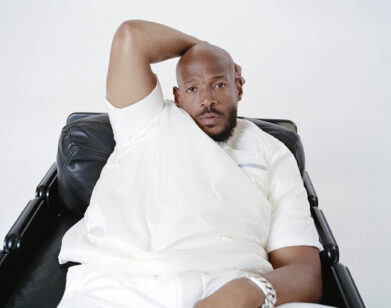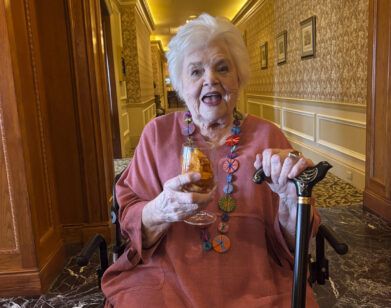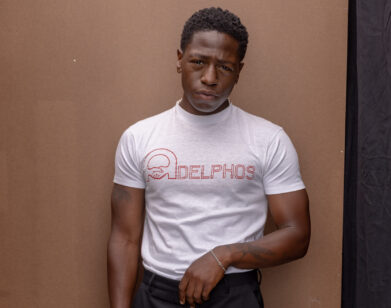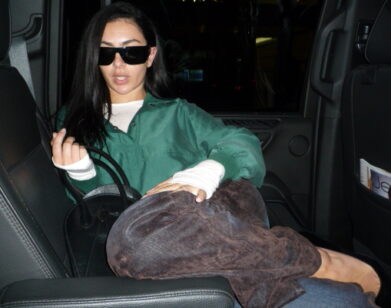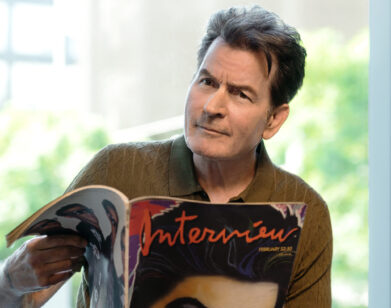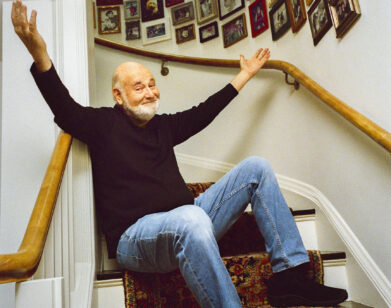Keeping Up with Rashida Jones
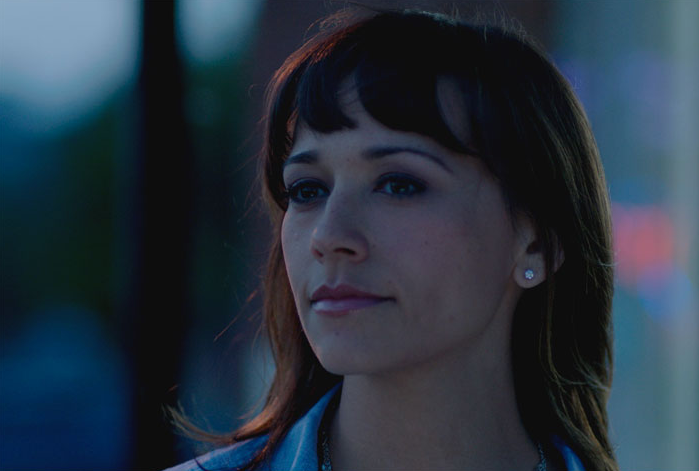
ABOVE: RASHIDA JONES IN CELESTE AND JESSE FOREVER. PHOTO COURTESY OF SONY PICTURES CLASSIC.
It is easy to dislike actress Rashida Jones on paper; the daughter of record producer Quincy Jones and actress Peggy Lipton is Hollywood-raised and Harvard-educated, so why wouldn’t she be successful? It’s not easy to dislike Jones once you’ve seen her on screen, and even less so once you’ve met her. Affable alongside Amy Poehler in NBC’s much-lauded series Parks and Recreation, and underused in many of her girlfriend film roles, Rashida Jones has paid her dues. At 36, it’s time for her to have a starring role and, like most smart actors in Hollywood, Jones finally decided to write one for herself. Celeste and Jesse Forever is Jones’ first script, co-written with her friend of over 10 years, actor Will McCormack. It is the tale of high school and college sweethearts falling out of love… sort of, to the extent that anyone can fall out of love with someone who has been an integral part of their life for two decades. Celeste, played by Jones, is driven and successful; Jesse, played by SNL‘s Andy Samberg, is amiably floundering, an un-employed, semi-aspiring artist. Celeste and Jesse are in their 30s, but they could easily be in their 50s, or even teenagers at the end of a first love.
Interview met with Rashida Jones earlier this week to talk about writing the film, immature rituals, and Twin Peaks.
EMMA BROWN: You’ve said that, to create the character of Celeste, you magnified the worst parts of yourself. What about the character of Jesse?
RASHIDA JONES: Jesse is probably, not a worse version of Will, but a version of Will—the version of Will that I first met when we were 25. He was sort of a little aimless pink cloud, poetic, romantic. He’s not really that anymore.
BROWN: How did you first meet?
JONES: His sister Mary McCormack is an actress, I’d done a movie with her, and she was like, “Meet my brother, he’s your soulmate, and you’re going to end up together.” We dated for three weeks in the ’90s, and then he wasn’t over his ex-girlfriend, I’d just gotten out of a relationship, we were drunk the whole time, so we became friends. Then we became best friends, and we spent every day together.
BROWN: Was his sister like, “Hey, way to shove me out”?
JONES: [laughs] No, I think she’s psyched that she was kind of right, because we are sort of soulmates, but in a different way. We still hang with her and I miss her; she has three kids and she was on a TV show in New Mexico for five years, so… we’re going to work our way back to being friends.
BROWN: And you never thought about having Will play Jesse?
JONES: When we first wrote it four years ago, yes, it was definitely me and Will. Then we made this decision to try to go the studio route with it, and we decided that it was more “viable” to have me attached—which, by the way, was almost not that viable—and not him. As time went on and the movie kept coming together, falling back apart, coming back together—weirdly, the more our of the studio system you get, the bigger name [actor] you have to have. By the time we actually made the movie, Will [was] a man; he’s not a man-child any more, [so] it just didn’t make as much sense. Also, I was dying to see him play Skillz, because he’s so funny and I don’t know if everybody knows how funny he really is. And Andy [Samberg] was so right for the part [of Jesse], he still had that hooded sweatshirt, Peter Pan thing happening.
BROWN: When did you get together and decide you wanted to write a movie? Had you discussed it for a long time?
JONES: We talked about it and didn’t do it for a long time. I think I had this weird intimidation; I had a lot of [college] friends, who, [when they] got out of school were writers—that’s what they were, everybody treated them as such. I wasn’t one of those people, and I didn’t quite know how to be one of those people. The mystery was solved for me when I just actually sat down and started writing; that’s what you have to do, you actually have to write to be a writer. Will and I just decided one summer, “Let’s write this idea and if it’s bad, nobody ever has to know, and if it’s a little better than bad, we can send it to friends, get input, and make it better.”
BROWN: Who was the first person you sent it to?
JONES: I think the first two people we sent it to were my friend Jesse Ehrman, who’s kind of the namesake of the movie, who I went to prom with, who works at Warner Brothers, is crazy smart, and reads lots of scripts; and our friend Nicky Winestock, who at the time was working with Judd Apatow, and now he’s his own production company. They’re both really smart, really supportive, and gave us tremendous notes. Then we sent it to Jennifer Todd, who produced the movie.
BROWN: Do you think that in 10 or 12 years, Jesse and Celeste will be together?
JONES: Hmm, that’s an interesting question. I don’t think so; I think they’ll be friends. I think they’ll be good friends, [but] I don’t think they could ever get back that thing, the timing was so wrong so many times that, I think eventually, you realize in order to grow at all you have to be with somebody else.
BROWN: No Prince Charles and Camilla post-Diana reunion?
JONES: Yes, and during, right? It was happening the whole time. No, none of that.
BROWN: Can you really be friends with someone that you were so deeply connected with?
JONES: I do—I think it will inherently always be complicated, and I think that you need a brief respite from the relationship; I don’t think you can do what Celeste and Jesse tried to do—can’t just seamlessly transition into friendship. I think there’s got to be a break in the time to process, and then guys need even longer to process because they take so long to even acknowledge anything’s happened. So I think you need time. I’m friends with a lot of my exes, but it took time. We didn’t just get into it. I don’t think you can be friends until you’re cool with them dating someone else. That’s when you know.
BROWN: Jesse and Celeste have a sort of cute and strange joke where they pretend to make pointy objects ejaculate. How did you come up with that?
JONES: Pointy objects! [laughs] I didn’t think about that. Will and I do that all the time. We go to the farmer’s market when we’re working and get food for lunch, and we get the biggest, like, seasonal Japanese cucumber—we go for big objects—and we just look stupid. It’s so immature.
BROWN: Did you enjoy being in almost every scene?
JONES: It was really cool. I experienced being on set in a very different way because I knew everybody so well—every crew member, everybody on set. I really liked it, because I was fully immersed. I think it would be hard for me to do because I have all these jobs now—I have a TV job, sometimes I have a movie job, and I have a writing job, and then there’s the press element to everything. [During Celeste and Jesse,] all I did was focus on the movie; I was in that headspace the whole time. [It was] such a short amount of time—so concentrated—that I could stay there and feel safe and good. But, it’s not something I aspire to do with every film, I’m not gunning to be a lead, I just feel like this was the right time to do it and maybe there’ll be another time in the future.
BROWN: Did you ever think of directing the film?
JONES: No, no. I mean, already it was a lot to be in it and write it and produce it. I just started thinking about whether I want to direct, and also Lee did such a fantastic job and I have such a reverence for directors. And when I got on set, even though I co-wrote it, I was not a writer, I just kind of handed myself over to him.
BROWN: What was your first job out of college, did you go straight into acting?
JONES: I went straight into auditioning, but that’s not really a job, you’re just trying to get a job all the time. The first two jobs out of college, I was a writer’s assistant on a pilot for MTV called World Famous that was about a hip-hop club; then I did some interning at Marie Claire for Mary Alice Stephenson. She was a stylist, she’s a TV personality now. I assisted her on a couple shoots.
BROWN: Was that fun? Because I’ve been a fashion intern and…
JONES: It was hardcore. It is hardcore. I worked at Barney’s for a summer in PR and that was super-hardcore. It’s no joke. Mary Alice is so nice that it was great, I got really lucky, but people can be slightly bitchy, for sure. Alek Wek was the model, and she was super nice on that very first job, but it’s demanding. Everything depends on you getting back on time, and having the right clothes, and it’s stressful. You have to really want it and really love it. I love fashion, but maybe I love it peripherally.
BROWN: Do you feel like going to an Ivy League school has helped or hindered your film career?
JONES: I don’t feel like it’s affected it. I think there is this thing where people are impressed—it gives you a leg up in the sense that people won’t treat you like a run-of-the-mill actress. They’ll assign “smart” to your word bank, your adjective bank. But it also makes you aspire for more, you think, “Oh my God, my parents spent all this money, I spent all this time writing a thesis and taking these classes, and I’m putting on makeup and learning lines to go try to get jobs.” There’ve been times when I have existential conversations with myself, and I’ve thought about leaving and trying to apply my education better. But ultimately it doesn’t really matter. Learning how to write, learning how to write papers and structure, that’s been very helpful for writing.
BROWN: Would you be an actor if your parents weren’t in the entertainment industry?
JONES: I don’t know. I have friends who have no choice; they came from whatever town, they didn’t have anybody in entertainment and they just knew they wanted to act and they did it. I’m kind of okay at a lot of different things; I guess having that early influence of being creative was really helpful, but my mom wasn’t a working actress until I was in high school, she quit to raise us. It wasn’t like I grew up around a lot of actors—I grew up around music people mainly, and my dad had friends [in the film industry] because he was scoring and producing films. I don’t know, I have a nature-nurture thing I’m constantly going back to. I believe a lot in nature. I think people kind of come in who they are, and it sort of doesn’t even matter who their parents are—it can affect you a little bit, and you can be guided and shaped.
BROWN: In terms of having an existential crisis about making the most of your education, it can be difficult if your parents work in other, more traditionally academic industries.
JONES: Right. I probably wouldn’t be acting if I didn’t grow up in Hollywood.
BROWN: How old were you when your mother was doing Twin Peaks?
JONES: I was 15.
BROWN: Did you get to watch it?
JONES: Yes, I would go to set a lot. I was totally obsessed with the show and in fact, I was terrified of Bob. Until I was 17, I would check under my bed every night, which is deranged for a teenager. I finally got up the nerve to introduce myself to him on set, because I was like, I have to get over this, and he was so nice. Thank God, because I didn’t want to go to college with that. [laughs]
CELESTE AND JESSE FOREVER COMES OUT IN THEATERS TOMORROW, AUGUST 3RD.

